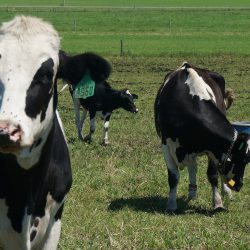Dr. Monika Dziuba, a 2023 graduate, is leaving Michigan State University with not only a DVM but also a Master of Science in Food Safety (MSFS) degree. She tackled both programs simultaneously and found that they bolstered each other.
Monika Dziuba is from southeast Michigan and didn’t grow up in an agricultural area, although her extended family runs a dairy farm in Poland. Her visit there as a child was her first exposure to agriculture and the experience led her to fall in love with the field. Though the MSFS program is under the LCS department many DVM students do not know it’s an option to pursue. It’s a Professional Science Masters oriented toward students already working in the food safety industry. The flexibility in scheduling and online formatting targeted towards working professionals also extends to someone undergoing a DVM program like Dziuba.

The MSFS program complements the DVM program in its content as well. “It provides an all-around One Health approach to both veterinary medicine and food safety, so it really helps to integrate the animal health we learn in the DVM program with human health and environmental concerns as well,” explains Dziuba.
Animal Health is Food Safety
“In Introduction to Food Safety Pathogens – because what we’re dealing with is often meat or dairy products – a lot of the pathogens dealt with in veterinary medicine and food safety intermingle. When learning about them while in my veterinary degree, the focus would be about helping the animal and how to sustain health in that aspect. On the food safety side, many of those same pathogens were of concern in the packaging and processing of food to keep the food safe for consumption.”
Additionally, Dziuba notes that the MSFS program is both holistic in its One Health approach, but also allowed her to focus on her specific veterinary interest in dairy. Her applied project – a final research project for the program – was in collaboration with Dr. Pamela Ruegg, and focused on disease detection on dairy farms. The resulting project is a marriage of food safety and veterinary medicine.
Dziuba appreciated the ability to dive deep into her dairy and agricultural interests from all angles. In past farm work, she was familiar with several dairy farm regulations. “Learning about the pasteurized milk ordinance in the masters program really showed me why the regulations exist. That helps me explain to farmers the reasoning behind the way it is and emphasize the importance of those regulations.”
Building Soft and Clinical Skills

She adds that the MSFS program helped her build additional communication and leadership skills. “Having additional practice in making presentations or working with different technologies and websites in the master’s program makes communications tasks easier and will better allow me to lead others through education and trainings using these skills.”
Further, Dziuba feels having both degrees under her belt lends her ethos. “I’m not from an agricultural background. However, food animal veterinarians, and veterinarians in general, are always consulted by the public about where their food is coming from and the safety of the food they’re picking up. It’s beneficial that I have this full scope understanding of the complete life cycle of their food product from the start of the animal’s life and health to finish in the supermarket so that I can give them the most correct information.”
Thinking About Pursuing a Dual Degree?
To any DVM students considering a One Health approach to veterinary medicine, Dziuba says, “If you’re already showing a little interest in food safety, doing the program is only going to grow that interest and show how those two programs intermingle. You’ll get a better understanding of both your DVM and your food safety courses because you’re taking them at the same time. The timing of both programs is hard, but now that I’m getting to the end of it, I’m happy that I did it.”




